CANNES, FRANCE — In one of the biggest surprises of the festival so far, the new film from Alejandro Jodorowsky can be watched and enjoyed without the influence of recreational drugs.
That may seem odd considering the source, the Chilean-born director of such hallucinatory cult classics as “El Topo” and “The Holy Mountain.” But the filmmaker’s first feature in 23 years — an autobiographical fantasia based on his own memories and books — plays less like his midnight staples than an unhinged variation on Fellini’s “Amarcord,” down the big-breasted women and son Adan Jodorowsky’s jaunty score.
Set in the author’s hometown of Tocopilla, Chile, the movie follows both the androgynous, initially golden-locked young Alejandro (Jeremias Herskovits) and his Communist father (played by another of El Maestro’s sons, his now-grown “El Topo” costar, Brontis Jodorowsky). Jews of Russian extraction in a remote community, the family stands out. The older man dresses like Stalin and obsesses over toughening up his son, even urging his kid to undergo dental surgery without anesthetic. (“You are a Jodorowsky!” he crows when the boy succeeds.)
It’s the kind of film in which men who’ve lost limbs in the mines populate the periphery to provide comic relief and the filmmaker intermittently turns up in an ice-cream suit to serve as an onscreen guide. Jordorowky’s mother (Pamela Flores) sings every line, and at one point urinates on her convulsing husband in order to heal him. (Between this and last year’s “The Paperboy,” the restorative piss is becoming an annual Cannes motif.) The father wanders off on a half-baked quest to assassinate the wealthy Chilean president, eventually discovering that he identifies more with tyrants than with the common man.
Despite a sometimes slapdash look — the low-fi seagull effects are just this side of “Birdemic” — it’s hard not to find this sort of controlled chaos endearing, certainly not when it’s peppered with as much affection and warmth as it is here. At the Q&A, one fan actually asked to kiss the director, ascending the stage to embrace him. For his part, the 84-year-old filmmaker, speaking in French, seemed less mad than modest. “I did not create it,” he said of his new film. “I received it.”
***
The Directors’ Fotnight screened “The Dance of Reality” back-to-back with “Jodorowsky’s Dune,” a documentary directed by Frank Pavitch on Jodorowsky’s legendary (and legendarily unsuccessful) 1975 attempt to bring Frank Herbert’s sci-fi tome to the screen. Among other tidbits, it’s surprising — given the auteur’s famously stoned audiences — that he wanted the movies themselves to provide all the altered state that was necessary. “I did not want LSD to be taken,” he explains. “I wanted to fabricate the drug’s effects.”
The “Dune” of Jodorowsky’s imagination would have been epic, with music by Pink Floyd, designs by Jean “Moebius” Giraud, and acting collaborations with Salvador Dalí, Orson Welles, and Mick Jagger — several of whom the director claims to have encountered simply by chance. The movie features ample explication of his designs, including an opening shot designed to top Orson Welles’s “Touch of Evil” and a spectacular Harkonnen fortress that, artist H.R. Giger admits, wasn’t actually in the novel. Director Nicolas Winding Refn (“Drive“), invited by Jodorowsky to sift through the storyboards, wonders what the film landscape would have looked like had “Dune” made it into theaters before “Star Wars.”
This is the type of quixotic project that no longer exists, conceived in an era when money for artistic ambition was considered no object (although, ultimately, it was — Hollywood’s reluctance to foot the remainder of the bill is what finally prevented the movie from being shot). And although we’ll never get to see the results — Jodorowsky confesses to feeling relief when David Lynch’s 1984 version turned out to be bad — the documentary suggests the collaborations and creative ferment Jodorowsky fostered leave a legacy that lasts to this day.












